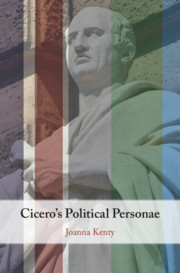Book contents
- Cicero’s Political Personae
- Cicero’s Political Personae
- Copyright page
- Contents
- Preface
- Acknowledgments
- Introduction
- Chapter 1 The Orator as Attacker
- Chapter 2 The Orator as Friend
- Chapter 3 The Orator as a Martyr
- Chapter 4 The Orator without Authority
- Chapter 5 The Champion of the Senate
- Chapter 6 The Popular Orator
- Chapter 7 The Voice of a Faction
- Chapter 8 A Great Man’s Spokesman
- Conclusion
- Works Cited
- Index locorum
- Index
Chapter 4 - The Orator without Authority
Published online by Cambridge University Press: 31 August 2020
- Cicero’s Political Personae
- Cicero’s Political Personae
- Copyright page
- Contents
- Preface
- Acknowledgments
- Introduction
- Chapter 1 The Orator as Attacker
- Chapter 2 The Orator as Friend
- Chapter 3 The Orator as a Martyr
- Chapter 4 The Orator without Authority
- Chapter 5 The Champion of the Senate
- Chapter 6 The Popular Orator
- Chapter 7 The Voice of a Faction
- Chapter 8 A Great Man’s Spokesman
- Conclusion
- Works Cited
- Index locorum
- Index
Summary
While auctoritas may seem to be a crucial prerequisite for the Roman orator, Cicero sometimes took on a nonauthoritative persona, especially in periods of domination by Pompey and Caesar: he made a show of fear, self-effacing humor, or stubborn silence. He performs fear especially in the introductions of Pro Milone and Pro Deiotaro in order to play down his own power to threaten Pompey and Caesar, and perhaps to provoke resentment of their power to threaten him. In Pro Milone and Pro Ligario, he makes a potentially comical statement that he will shout to be heard, acting foolishly to break political tension. In his letters and in the Brutusunder Caesar’s dictatorship, he proclaims his refusal to speak in public in order to show resistance to the new regime, using silence as an act of protest. I read this as rhetoric of withdrawal or disengagement rather than a transparent reflection of reality.
- Type
- Chapter
- Information
- Cicero's Political Personae , pp. 103 - 128Publisher: Cambridge University PressPrint publication year: 2020

